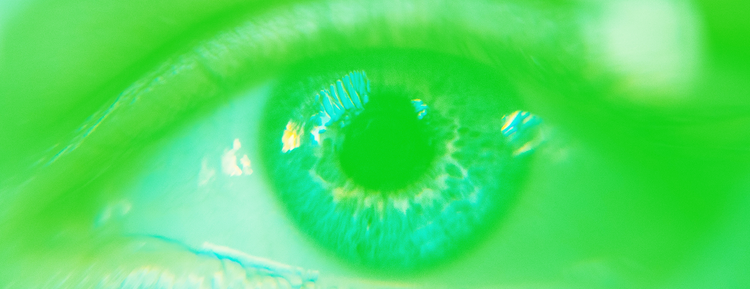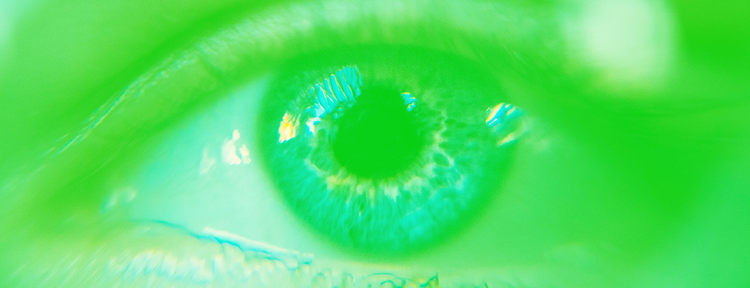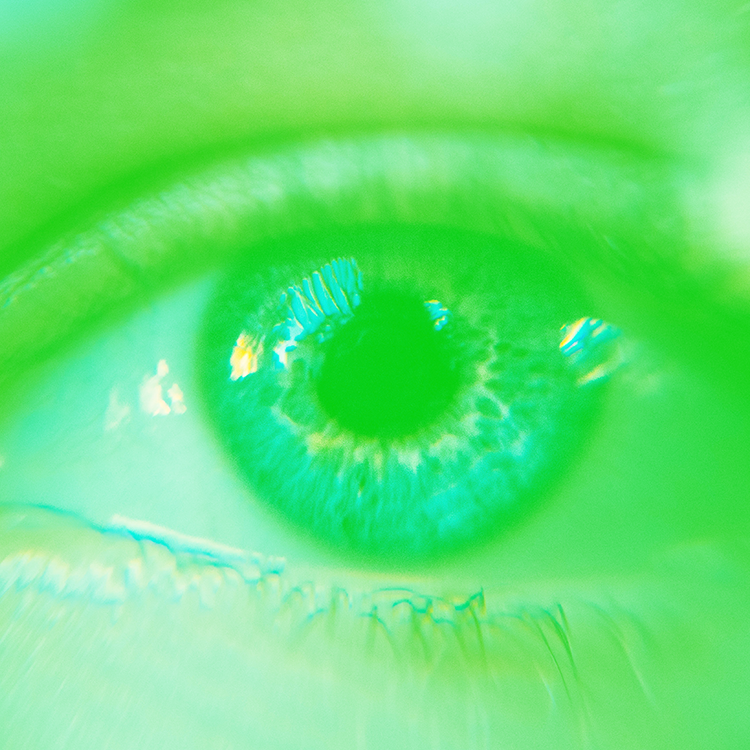Vision problems



MS can affect your vision. We’re focussed on changing that.
Vision problems are common in people with MS and are often the first sign of the disease before diagnosis.1,2 Although vision problems can come on suddenly and can have a big impact on almost every aspect of your daily life, they are often short-lived and there are ways to manage them.3
For most people, vision problems come and go, although about 1 in 3 people living with MS can have more lasting vision problems later in their disease.4 It’s very rare that someone will completely lose their sight from MS, and those who experience lasting vision problems often do so gradually over a number of years.3 Things like stress, heat and fatigue can sometimes make vision problems worse, so try to stay cool and rested if this is the case with you.5
An ophthalmologist (eye doctor) or a neurologist will usually detect and assess vision problems. They might give you eye examination or refer you for an MRI to look at inflammation of the nerve in your eye (the optic nerve).6
The most common vision problems related to MS include6,7:
- Double vision (diplopia)
- Inflammation of the optic nerve, which can cause eye pain, blurry vision and other vision problems (optic neuritis)
- Involuntary eye movements (nystagmus)
These are discussed in more detail in the sections below.
You may need to tell your local driving authority if you have MS and if you experience vision problems, as this may affect your ability to drive.4 They can advise you on whether or not you should drive, depending on how your vision problems are affecting you.
If you have or are thinking about getting a job that involves driving and you’re experiencing vision problems, you may need to report this to your employer for legal reasons. For more guidance and advice around working with MS, see our careers section.
Read on to find out how you can manage vision problems, and minimise their impact on your life.
It’s not always easy to know if your eye problems are caused by MS or something else. It’s important to give your doctor all the details so they can work out what’s going on. Let them know as soon as you notice any changes to your eyesight or pain in your eyes.4 It’s also good idea to have your eyes tested regularly, and to tell your opthamologist (eye doctor) about any issues, as soon as you notice them.
Catching these problems as early as possible can help minimise underlying damage caused by MS, and speed up your symptom recovery.4
Read on to find out more about the type of vision problems you might expereince, and how they can be managed.
What is double vision?
Double vision (diplopia) is when you can see two images instead of one. It happens when the messages travelling from each of your eyes to your brain aren’t coordinated, so each eye sees a separate image.8
Just over a third of people living with MS get double vision.9 If you have double vision, the two images might appear side by side, on top of one another, or even a little tilted.10 Everyone’s experience is different. You might only get double vision when you look in a certain direction. It might also make you feel nauseous or like you’re spinning or it might cause problems with your balance.4

Grace
How can I manage double vision?
It can sometimes help to wear a patch over one eye to block out one of the images.8 If you get double vision as part of a relapse, it will usually recover on its own, but you may be prescribed steroids to help speed up your recovery.4 If your double vision continues over the longer term, your healthcare team may suggest adding a special prism to your glasses, which will help to realign the two images.3,8
What is optic neuritis?
Optic neuritis occurs when MS causes inflammation and damage to the nerve in your eye (known as the optic nerve).1,10 It’s a common problem, with around half of people with MS experiencing it at some point. It is often the first symptom people notice before diagnosis.1,4,9
Optic neuritis can cause5,10:
- Pain in the eye
- Flashes of light
- Blind spots
- Blurred, hazy, or dim vision
- Loss of vision in one eye
- Less vivid or washed-out colours
- Limited field of vision
Optic neuritis usually comes on suddenly, then gets worse over a few days. It is often most severe about 2 weeks after it starts. After that, things usually start to get better and completely resolve after about a month.6
How can I manage optic neuritis?
Optic neuritis is usually only temporary, but if it’s bothering you, your doctor might prescribe high-dose steroids to speed up your recovery and avoid permanent nerve damage.1 Remember, if you experience any problems with your eyes, it’s important to talk to your healthcare team. They can assess the underlying cause and help you get the right treatment for the specific vision problems you’re facing.
What is nystagmus?
Nystagmus, sometimes called ‘dancing eyes’, can happen when damage occurs to the certain parts of your brain or the nerve in your eye.10–12 It can make your eyes move on their own so they flick rapidly from side to side, up and down, or around a fixed point.11
Nystagmus affects almost a third of people living with MS.13 It is a common cause of dizziness and nausea, and can sometimes lead to other vision problems. If you also have balance problems, it can make you more likely to have falls.10
If you experience nystagmus, you might sometimes develop a head nod or shake – this is your body trying to offset the effect of the flickering eyes to help you concentrate.14
How can I manage nystagmus?
If nystagmus is affecting you, your healthcare team may suggest the following:
- Wearing special glasses or contact lenses14
- Surgery or Botox injections15
- Medications including muscle relaxants and anti-anxiety tablets.12,16
Make sure you talk to your healthcare team as soon as you experience any visual problems, so they can recommend the best ways to manage them.
What is kaleidoscope vision?
Kaleidoscope vision makes it look like you’re peering through a kaleidoscope – it can make images look like they’re broken up and brightly coloured or shiny.17 This vision problem is often short-lived – it usually happens before you get a migraine, which can happen more often in people with MS.17,18
Two types of migraine can cause kaleidoscope vision19:
- Visual migraine — nerve cells in your brain misfire, sending jumbled signals to your eye. This can cause a visual effect called an ‘aura’ in your field of vision
- Retinal migraine — less blood flows to your eye which may cause a blind spot, flashing lights, or even temporary blindness in one eye
How can I manage kaleidoscope vision?
Although this vision problem can be worrying, it’s usually short-lived and will disappear within an hour, so treatments for kaleidoscope vision are not usually needed or prescribed.17,19
What is scotoma?
A scotoma is a blind spot in your vision, which can be caused by damage or inflammation to the nerve in your eye (this damage is called optic neuritis).10,16 The spot may be in the centre or around the edges of your field of vision.6 It could be dark, very light, blurred or flickering.20 You may have trouble seeing certain colours or need bright light to see clearly.21
A blind spot may also be related to other conditions. For example, it can be an early sign of a migraine.21,22
How can I manage scotomas?
If a blind spot is caused by inflammation of the nerve in your eye as part of a relapse, your doctor can prescribe steroids to calm the inflammation.16 There are also things you can try to work around this problem, which include:
- Audio books – these allow you to hear text from books read out, so you don’t need to strain your eyes to read the text
- Magnifying glasses – you can wear these on your eyes to make small details bigger and easier to see, which can help if there is a blind spot in the way of your field of vision
- Filters to reduce glare on computer screens – these can make using a computer more comfortable if you have problems with your vision20
If your blind spot is related to a migraine, it will usually go away on its own within an hour or so, so you won’t need to do anything to treat it.21,22
What is vision loss?
Most vision problems related to MS are temporary and your sight will usually return to normal soon after they start.4 However, sometimes vision problems get worse over time and some people can gradually lose their vision. This usually happens after some time, during the later stages of MS.23 It’s very rare that someone will actually go blind from having MS, and lasting vision problems usually mean having to adapt to a change in how you see things.3
How can I manage vision loss?
If your vision does start to get worse, it can be a scary experience. But there are things you can do to make your day-to-day life easier, and help you get the most out of your eyesight:4
- Improve the lighting around your home - some overhead LED lights are brighter than regular bulbs, so they can make things easier to see
- Get some new household items – you can get special items designed to help with your day-to-day living. For example, measuring jugs with markings that are easier to read, or talking timers
- Change the font size or use accessibility features on your devices – Some computers, phones and tablets have special features that make them easier to use if you have problems with your sight

Grace
There are some treatments that work on the underlying disease process, to help to slow down vision loss. Talk to your healthcare team about management options that might be right for you.24
It’s understandable to feel worried if you experience any type of vision loss. If vision problems or vision loss are making you feel very worried, our mental health and wellbeing section has advice on coping with anxiety. We also have a page on support groups, so you can find people to talk to who have had these experiences too.
Nobody chooses to have MS. But everybody should have a choice how to manage it.
Find out more about different MS symptoms below.
- Gal RL, et al. Corticosteroids for treating optic neuritis. Cochrane Database Syst Rev. 2015;8. Art. No.:CD001430.
- NICE Diagnosing Multiple Sclerosis -NICE Pathway (updated April 2020) http://pathways.nice.org.uk/pathways/multiple-sclerosis [accessed July 2020].
- National Multiple Sclerosis Society. Vision Problems in Multiple Sclerosis. https://www.nationalmssociety.org/nationalmssociety/media/msnationalfiles/brochures/brochure-vision-problems.pdf [accessed July 2020].
- MS Society. MS and your eyes 2018. https://www.mssociety.org.uk/care-and-support/resources-and-publications/publications-search/ms-and-your-eyes [accessed July 2020].
- MS Society. Eye movement problems. https://www.mssociety.org.uk/about-ms/signs-and-symptoms/eyes-and-sight/eye-movement-problems [accessed July 20].
- Graves J, Balcer LJ. Clin Ophthalmol. 2010;4:1409–22.
- Mayo Clinic. Multiple Sclerosis. https://www.mayoclinic.org/diseases-conditions/multiple-sclerosis/symptoms-causes/syc-20350269?p=1 [accessed July 2020].
- Adriana ID, et al. Romanian J Ophthalmol 2017;61:166–70.
- Jasse L, et al. Mult Scler. 2013;19:1618–26.
- Gelfand JM. Handb Clin Neurol. 2014;122:269–90.
- Serra A, et al. Front Neurol 2018;9:31.
- Niestroy A, et al. Clin Ophthalmol 2007;1:267–72.
- Medscape. What is Nystagmus in Multiple Sclerosis? https://www.medscape.com/answers/1214270-166040/what-is-nystagmus-in-multiple-sclerosis-ms. [accessed July 2020].
- MS Trust. Nystagmus https://www.mstrust.org.uk/a-z/nystagmus [accessed July 2020].
- Hobson F, Rowe FJ. Br Orthopt J 2009;6:28–33.
- Pula JH, et al. Int J MS Care 2010;12:106–13.
- Healthline. https://www.healthline.com/health/kaleidoscope-vision [accessed July 2020].
- Healthline. What’s causing my kaleidoscope vision? https://www.healthline.com/health/kaleidoscope-vision [accessed July 2020].
- Kister I, et al. J Headache Pain 2010;11:417–25.
- New Life Outlook. How common Is kaleidoscopic vision in people with MS? https://ms.newlifeoutlook.com/kaleidoscope-vision-multiple-sclerosis/ [accessed July 2020].
- Summit Medical Group. Vision, blind spot (scotoma). https://www.summitmedicalgroup.com/library/adult_health/oph_scotoma/ [accessed July 2020].
- NICE CKS. Multiple Sclerosis. https://cks.nice.org.uk/multiple-sclerosis#!topicSummary. [accessed July 2020].
- van Dongen RM, Haan J. F1000Res 2019.2019;8:1219.
- Medical News Today. How does MS affect the eyes? https://www.medicalnewstoday.com/articles/325451. [accessed July 2020].
- Moss HE. Eye Brain 2017:9 13–21.